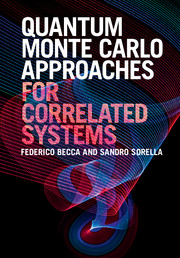Book contents
- Frontmatter
- Contents
- Preface
- Acknowledgements
- Part I Introduction
- Part II Probability and Sampling
- Part III Variational Monte Carlo
- 5 Variational Monte Carlo
- 6 Optimization of Variational Wave Functions
- 7 Time-Dependent Variational Monte Carlo
- Part IV Projection Techniques
- Part V Advanced Topics
- Appendix Pseudo-Random Numbers Generated by Computers
- References
- Index
5 - Variational Monte Carlo
from Part III - Variational Monte Carlo
Published online by Cambridge University Press: 17 November 2017
- Frontmatter
- Contents
- Preface
- Acknowledgements
- Part I Introduction
- Part II Probability and Sampling
- Part III Variational Monte Carlo
- 5 Variational Monte Carlo
- 6 Optimization of Variational Wave Functions
- 7 Time-Dependent Variational Monte Carlo
- Part IV Projection Techniques
- Part V Advanced Topics
- Appendix Pseudo-Random Numbers Generated by Computers
- References
- Index
Summary
Quantum Averages and Statistical Samplings
In this chapter, we discuss the general framework in which the variational Monte Carlo methods are defined and few important implementations for interacting systems of bosons and fermions on the lattice. The main advantage of considering this approach relies on the variational principle that has been shown in section 1.4: the energy of a given quantum state is always bounded from below by the exact ground-state one, giving us the route to obtain the best possible solution to the problem. In most cases, a suitable parametrization of the variational wave function allows us to consider a wide range of different quantum phases (e.g., metals, superconductors, and insulators). By performing an optimization of the parameters, we can reach the lowest-energy state, which is expected to capture the correct ground-state behavior. Therefore, variational wave functions represent a flexible and valuable approach to get important insights into the low-energy properties of models that cannot be solved by exact methods. By contrast, the main limitation of this approach is the fact that it is based on a given Ansatz, which may contain a relevant bias that cannot be removed within the chosen parametrization.
We also mention that variational wave functions can be easily defined and treated for a wide class of models, irrespective of the range of interactions and the dimension of the local (i.e., single-site) Hilbert space, which can be even infinite and does not need the use of an uncontrolled cutoff to work with a finite-dimensional space. In this respect, variational Monte Carlo is better than other methods, like densitymatrix renormalization group or tensor-network methods in which the complexity dramatically increases with both the range of the interaction and the dimension of the local Hilbert space (White, 1992; Schollwöck, 2005, 2011).
Let us start by describing the general framework in which variational Monte Carlo methods are defined. First of all, we fix a complete basis set in the Hilbert space, in which (for simplicity) the states are taken to be orthogonal and normalized such that:
Then, any quantum state can be written as:
In turn, the expectation value of an operator over a given variational wave function takes the following form:
The main problem in evaluating the expectation value is that the number of configurations in the sum is exponentially large with the number of particles.
- Type
- Chapter
- Information
- Quantum Monte Carlo Approaches for Correlated Systems , pp. 103 - 130Publisher: Cambridge University PressPrint publication year: 2017



